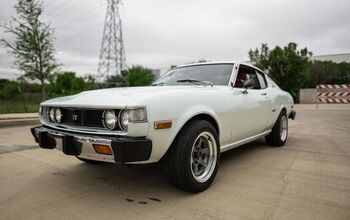Takata to Plead Guilty, Will Issue $1 Billion in Restitution for Deadly Airbags

Automotive parts supplier Takata Corp, along with three of its former employees, were charged by federal prosecutors with concealing the deadly defect of its airbag inflators.
The devices have been subject to an unprecedentedly massive recall and have have been linked to at least 11 fatalities in the United States. Takata has agreed to plead guilty to the charges against it and will pay $1 billion in restitution.
Of the billion dollar penalty, $850 million is set aside for automakers that purchased the inflators, while $125 million will go toward the individuals injured by the defective products. The remaining money will serve as a general criminal fine.
The federal grand jury also indicted former Takata employees. Filed in early December and unsealed today, the indictment alleges the three workers falsified and doctored reports to mask test results that would have shown that the inflators were dangerously faulty. The three men — Shinichi Tanaka, Hideo Nakajima and Tsuneo Chikaraishi — have been charged with six counts of conspiracy to commit wire fraud, and wire fraud.
“Automotive suppliers who sell products that are supposed to protect consumers from injury or death must put safety ahead of profits,” U.S. Attorney Barbara L. McQuade said in an official statement to the press. “If they choose instead to engage in fraud, we will hold accountable the individuals and business entities who are responsible.”
Takata’s airbags differ from others in that the inflators use an ammonium nitrate propellant to quickly fill the crash bags. However, the chemical can become unstable over time, expand too quickly, and blow apart the metal canister. Prosecutors said that the company was aware that its inflators were not performing to industry specifications as early as 2000, but sold them to automakers anyway. The parts supplier even encouraged customers to purchase systems by submitting fraudulent reports that concealed the failures and ruptures during testing, prosecutors said.
The U.S. has ordered Takata to recall all of its faulty air bags by the end of 2019. The matter is being conducted in a way that prioritizes higher-risk cars sold in states with elevated temperatures and humidity. Roughly 46 million airbags in over 29 million vehicles have been recalled since December 2016. Another 25 million additional units are set to be recalled over the next two years.
As for the criminal fine, payments to the individual victims will begin immediately. Money allocated to automakers must be paid within five days of Takata’s anticipated sale or merger — one of which is anticipated to occur within the year.
The company has also been fined $70 million by U.S. safety regulators for its slow handling of the recall. There could also be an additional $130 million fine leveled from the National Highway Traffic Safety Administration, but only if Takata can’t fulfill the terms of a consent order agreed to in November of 2015.
Considering the overwhelming costs involved with the recall and legal expenses, financial analysts fully expect Takata’s U.S. operations — located in the Auburn Hills, Michigan — to seek bankruptcy protection.
[Image: Takata]

A staunch consumer advocate tracking industry trends and regulation. Before joining TTAC, Matt spent a decade working for marketing and research firms based in NYC. Clients included several of the world’s largest automakers, global tire brands, and aftermarket part suppliers. Dissatisfied with the corporate world and resentful of having to wear suits everyday, he pivoted to writing about cars. Since then, that man has become an ardent supporter of the right-to-repair movement, been interviewed on the auto industry by national radio broadcasts, driven more rental cars than anyone ever should, participated in amateur rallying events, and received the requisite minimum training as sanctioned by the SCCA. Handy with a wrench, Matt grew up surrounded by Detroit auto workers and managed to get a pizza delivery job before he was legally eligible. He later found himself driving box trucks through Manhattan, guaranteeing future sympathy for actual truckers. He continues to conduct research pertaining to the automotive sector as an independent contractor and has since moved back to his native Michigan, closer to where the cars are born. A contrarian, Matt claims to prefer understeer — stating that front and all-wheel drive vehicles cater best to his driving style.
More by Matt Posky
Latest Car Reviews
Read moreLatest Product Reviews
Read moreRecent Comments
- Lynn Joiner Lynn JoinerJust put 2,000 miles on a Chevy Malibu rental from Budget, touring around AZ, UT, CO for a month. Ran fine, no problems at all, little 1.7L 4-cylinder just sipped fuel, and the trunk held our large suitcases easily. Yeah, I hated looking up at all the huge FWD trucks blowing by, but the Malibu easily kept up on the 80 mph Interstate in Utah. I expect a new one would be about a third the cost of the big guys. It won't tow your horse trailer, but it'll get you to the store. Why kill it?
- Lynn Joiner Just put 2,000 miles on a Chevy Malibu rental from Budget, touring around AZ, UT, CO for a month. Ran fine, no problems at all, little 1.7L 4-cylinder just sipped fuel, and the trunk held our large suitcases easily. Yeah, I hated looking up at all the huge FWD trucks blowing by, but the Malibu easily kept up on the 80 mph Interstate in Utah. I expect a new one would be about a third the cost of the big guys. It won't tow your horse trailer, but it'll get you to the store. Why kill it?
- Ollicat I am only speaking from my own perspective so no need to bash me if you disagree. I already know half or more of you will disagree with me. But I think the traditional upscale Cadillac buyer has traditionally been more conservative in their political position. My suggestion is to make Cadillac separate from GM and make them into a COMPANY, not just cars. And made the company different from all other car companies by promoting conservative causes and messaging. They need to build up a whole aura about the company and appeal to a large group of people that are really kind of sick of the left and sending their money that direction. But yes, I also agree about many of your suggestions above about the cars too. No EVs. But at this point, what has Cadillac got to lose by separating from GM completely and appealing to people with money who want to show everyone that they aren't buying the leftist Kook-Aid.
- Jkross22 Cadillac's brand is damaged for the mass market. Why would someone pay top dollar for what they know is a tarted up Chevy? That's how non-car people see this.
- 3SpeedAutomatic A great opportunity for an auto maker (Toyota) who’s behind the curve in EV development. Fisker would be the Leading Edge division with trickle down technology to the other divisions as EVs eventually become mandatory.


































Comments
Join the conversation
Why is the Takata logo the state of Utah?
I wish I had more details on the execs who made out like bandits at Takata before bailing with their golden parachute. I'm sure there were more than three people involved in this cover up. I would also like to know if these three employees (who I'm guessing reside in Japan) will be extradited to face justice. My guess is no but that's just me being cynical after witnessing years of corporate malfeasance without ever being held accountable for screwing over countless consumers.